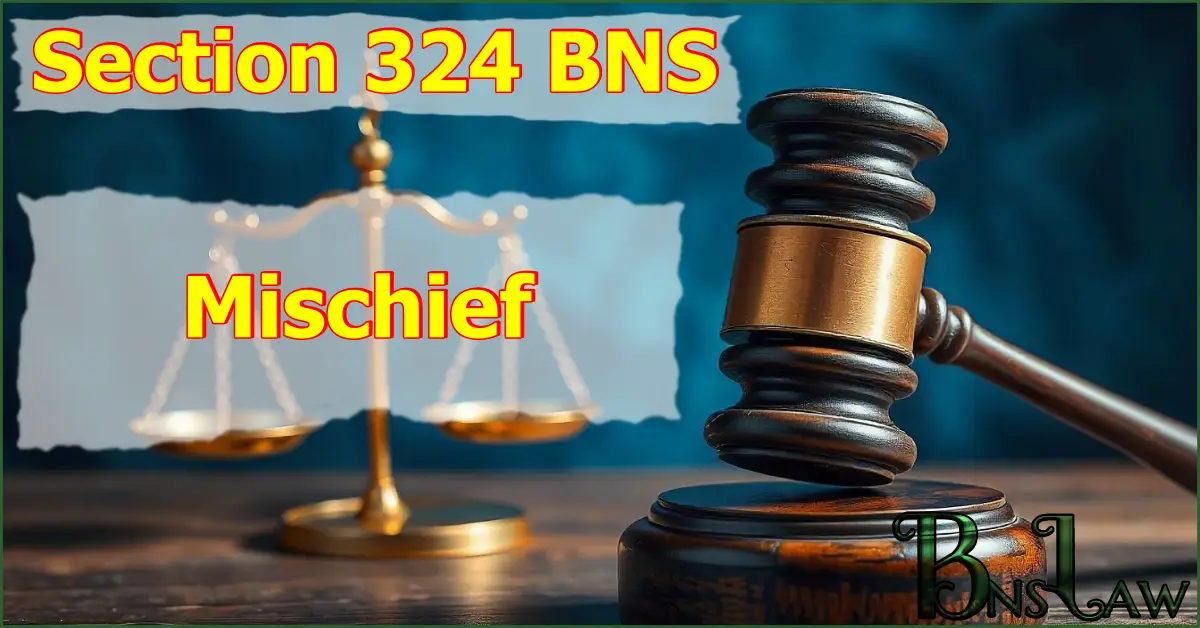Section 324 BNS | BNS 324
324(1) BNS
Whoever with intent to cause, or knowing that he is likely to cause, wrongful loss or damage to the public or to any person, causes the destruction of any property, or any such change in any property or in the situation thereof as destroys or diminishes its value or utility, or affects it injuriously, commits mischief.
Explanation 1— It is not essential to the offence of mischief that the offender should intend to cause loss or damage to the owner of the property injured or destroyed. It is sufficient if he intends to cause, or knows that he is likely to cause, wrongful loss or damage to any person by injuring any property, whether it belongs to that person or not.
Explanation 2— Mischief may be committed by an act affecting property belonging to the person who commits the act, or to that person and others jointly.
Illustrations
(a) A voluntarily burns a valuable security belonging to Z intending to cause wrongful loss to Z. A has committed mischief.
(b) A introduces water into an ice-house belonging to Z and thus causes the ice to melt, intending wrongful loss to Z. A has committed mischief.
(c) A voluntarily throws into a river a ring belonging to Z, with the intention of thereby causing wrongful loss to Z. A has committed mischief.
(d) A, knowing that his effects are about to be taken in execution in order to satisfy a debt due from him to Z, destroys those effects, with the intention of thereby preventing Z from obtaining satisfaction of the debt, and of thus causing damage to Z. A has committed mischief.
(e) A having insured a ship, voluntarily causes the same to be cast away, with the intention of causing damage to the underwriters. A has committed mischief.
(f) A causes a ship to be cast away, intending thereby to cause damage to Z who has lent money on bottomry on the ship. A has committed mischief.
(g) A, having joint property with Z in a horse, shoots the horse, intending thereby to cause wrongful loss to Z. A has committed mischief.
(h) A causes cattle to enter upon a field belonging to Z, intending to cause and knowing that he is likely to cause damage to Z’s crop. A has committed mischief.
324(2) BNS
Whoever commits mischief shall be punished with imprisonment of either description for a term which may extend to six months, or with fine, or with both.
324(3) BNS
Whoever commits mischief and thereby causes loss or damage to any property including the property of Government or Local Authority shall be punished with imprisonment of either description for a term which may extend to one year, or with fine, or with both.
324(4) BNS
Whoever commits mischief and thereby causes loss or damage to the amount of twenty thousand rupees and more but less than one lakh rupees shall be punished with imprisonment of either description for a term which may extend to two years, or with fine, or with both.
324(5) BNS
Whoever commits mischief and thereby causes loss or damage to the amount of one lakh rupees or upwards, shall be punished with imprisonment of either description for a term which may extend to five years, or with fine, or with both.
324(6) BNS
Whoever commits mischief, having made preparation for causing to any person death, or hurt, or wrongful restraint, or fear of death, or of hurt, or of wrongful restraint, shall be punished with imprisonment of either description for a term which may extend to five years, and shall also be liable to fine.
READ OTHER SECTIONS OF CHAPTER XVII — OF OFFENCES AGAINST PROPERTY
FAQs of BNS Section 324
-
324 BNS punishment and fine
Punishment and fine under Section 324 of the BNS—
324(2): Imprisonment for 6 months, or fine, or both.
324(3): Imprisonment for 1 year, or fine, or both.
324(4): Imprisonment for 2 years, or fine, or both.
324(5): Imprisonment for 5 years, or fine, or both.
324(6): Imprisonment for 5 years, and fine. -
324 BNS cognizable or not
The offence under Section 324(2), 324(3) and 324(4) of the BNS is non-cognizable and the offence under Section 324(5) and 324(6) is cognizable.
-
324 BNS bailable or not
The offence under Section 324(2), 324(3), 324(4), 324(5) and 324(6) of the BNS is bailable.
-
324 BNS trial court
Offence specified in Section 324(2), 324(3) and 324(4) of the BNS is triable by any Magistrate, while the offence specified in Section 324(5) and 324(6) is triable by the Magistrate of the first class.
Important Points
- Cognizable Offences: These are offences where a police officer can arrest a person without a warrant.
- Non-Cognizable Offences: These are offences where a police officer cannot arrest a person without a warrant.
- Bailable Offences: These are offences where the accused can get bail from the police station itself. All bailable offences are listed in the First Schedule of the Bharatiya Nagarik Suraksha Sanhita (BNSS).
- Non-Bailable Offences: Offences in which bail is not granted directly from the police station but after hearing the case in the court, the judge decides when bail will be granted. All non-bailable offences are listed in the first schedule of the Bharatiya Nagarik Suraksha Sanhita (BNSS).
- In the above FAQ, “trial court” means the court that has jurisdiction to try the offence.
- In the above FAQ, the expression “Magistrate of the first class” and “Any Magistrate” does not include Executive Magistrates.
Read other Sections of the BNS
Reference Link: New Criminal Laws (BNS), Ministry of Home Affairs







